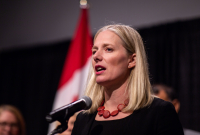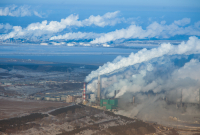Support strong Canadian climate journalism for 2025
Saskatchewan's environment minister says he's disappointed but not surprised that the federal government is reducing carbon tax rebates for the province's residents in the new year.
Dustin Duncan is also questioning what changed in the federal government's calculations.
He says he's scheduled to meet with federal Environment Minister Jonathan Wilkinson this week in Regina and intends to raise the subject.
"I'm sure there would have been campaign literature that would have specified the estimated rebate for 2020 for Saskatchewan residents. That wasn't that long ago, so one of my questions will be what's changed in the calculation?" Duncan said Tuesday.
Ottawa says it will be lowering carbon tax rebates for people in Saskatchewan, Ontario and Manitoba — provinces it says don't meet federal carbon pricing standards.
It says it introduced a price on pollution as a way to combat climate change and reduce greenhouse gas emissions.
Saskatchewan is to see the largest decrease. A family of four will be eligible for rebates totalling $809 in 2020 — about $100 less than the $903 projected last year.
"Merry Christmas from the federal government," Duncan said.
Saskatchewan is to take its carbon tax challenge to the Supreme Court of Canada next year after the province's Appeal Court ruled in favour of the federal government's ability to impose a price on consumers.
Duncan said Saskatchewan will be watching the outcome of the ongoing carbon tax challenge before Alberta's Court of Appeal.
The federal government decided last week to approve New Brunswick's consumer carbon pricing plan. That province had initially rejected its own carbon tax, but after Prime Minister Justin Trudeau's election win, Premier Blaine Higgs announced it would meet Ottawa's requirements.
Duncan said he understands that New Brunswick plans to charge a four-cents-a-litre carbon levy on fuel and offer a reduction of about three cents on its fuel tax.
"If that's the case, then what are we talking about?" he said.
"If we're going to add four cents a litre onto fuel and do a corresponding reduction of almost an equivalent amount, then how does this accomplish what the federal government says it's going to accomplish?"
This report by The Canadian Press was first published Dec. 17, 2019.




Comments
And here, just when I thought it impossible to suck and blow at the same time, this guy goes ahead and proves me wrong.